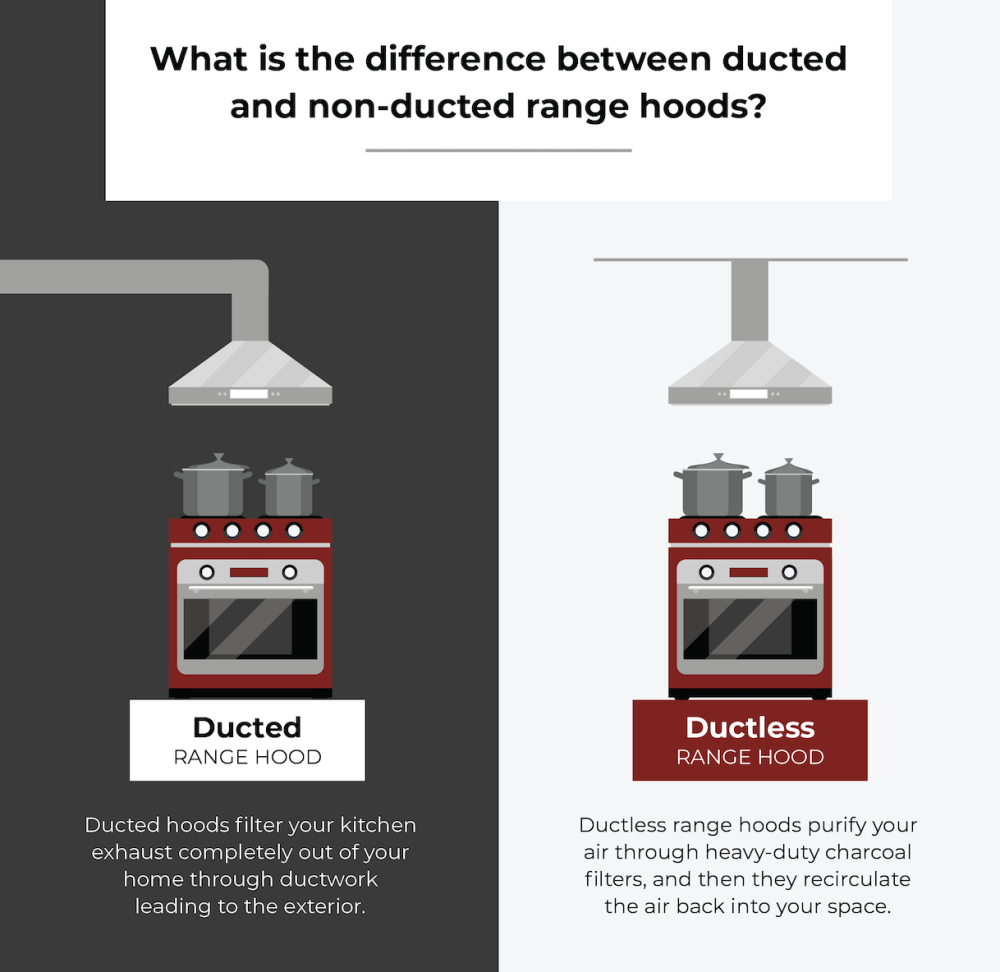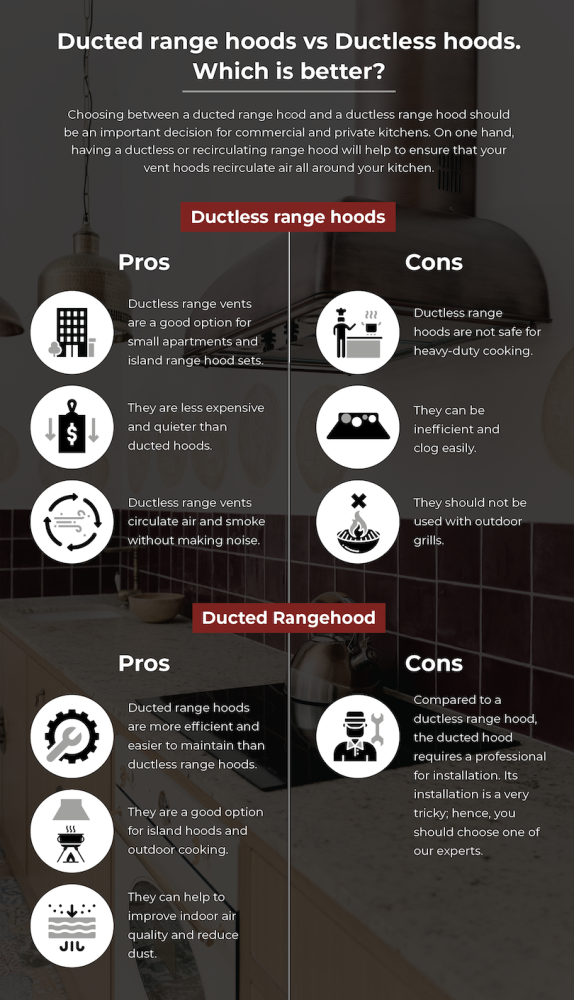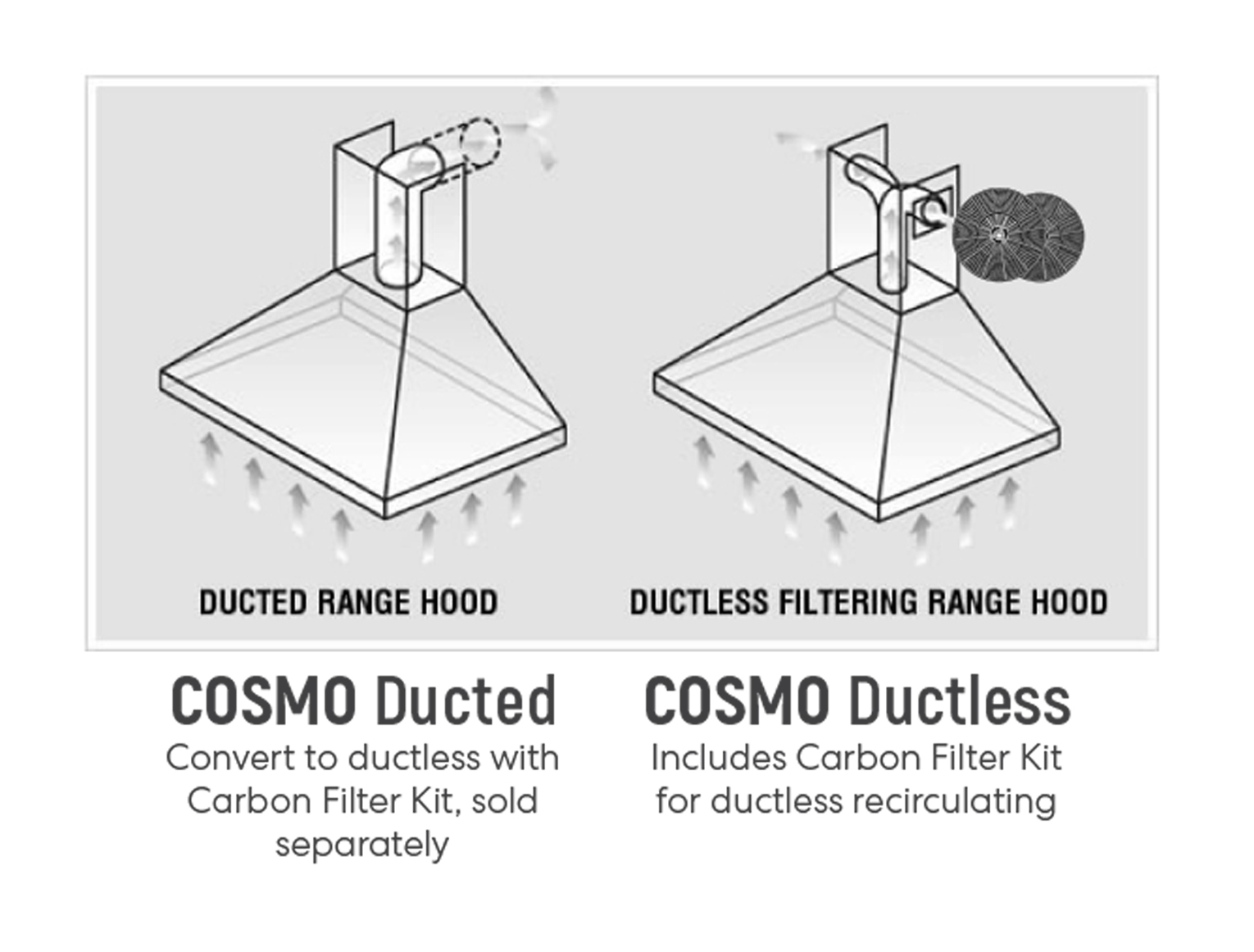Are you on the hunt for the perfect range hood to elevate your kitchen experience? Choosing between a ducted and a ductless range hood can be a daunting task, but it doesn’t have to be.
Whether you’re a passionate home cook or someone who simply enjoys a clean and fresh kitchen, the right range hood can make all the difference. This guide will help you understand the key differences and advantages of each type, so you can make a well-informed decision that suits your needs.
Stay with us as we break down the benefits and potential drawbacks of ducted versus ductless range hoods. Your ideal kitchen environment is just a few insights away!
Ducted Range Hoods
When you’re cooking up a storm in the kitchen, the last thing you want is lingering smoke or odors. Ducted range hoods are your reliable partners in keeping the air clean and fresh. These powerful devices use a ventilation system to draw out smoke, steam, and smells, channeling them outside your home. Whether you’re frying up bacon or simmering a spicy stew, a ducted range hood ensures your cooking environment stays pleasant.
How They Work
Ducted range hoods use a series of ducts to transport air from your kitchen to the outside. The hood captures the air directly above your stove, using a fan to pull it through the ductwork. This process not only removes smoke but also expels heat and humidity. It’s like having a silent assistant, quietly working to keep your kitchen comfortable.
Key Features
- Powerful Ventilation:Equipped with strong fans, they efficiently move large volumes of air.
- External Venting:Air is vented outside, ensuring minimal recirculation inside your home.
- Variety of Designs:Available in various styles and finishes to match your kitchen decor.
Advantages
One of the major advantages of ducted range hoods is their ability to effectively remove air pollutants. They offer superior performance compared to ductless models.
Moreover, they help in controlling kitchen temperature by venting out hot air. This can be a game-changer during summer months.
Do you enjoy cooking aromatic dishes but worry about lingering smells? A ducted range hood can make your kitchen smell fresh again quickly.
Disadvantages
Installing ducted range hoods can be complex and require professional help. This might add to your renovation costs.
In some homes, especially apartments, installing ducts can be challenging due to space constraints. Have you checked your kitchen layout for duct compatibility?
Maintenance can also be demanding. Regular cleaning of the ducts is essential to keep the system efficient.
Before deciding on a ducted range hood, consider your kitchen’s design, your cooking habits, and your budget. What matters most to you when choosing a range hood? Whether it’s performance or convenience, understanding your needs will lead to the best choice for your home.

Credit: www.worldcoppersmith.com
Ductless Range Hoods
When considering a kitchen upgrade, you might be weighing the options between ducted and ductless range hoods. Ductless range hoods, also known as recirculating hoods, have become increasingly popular for their convenience and ease of installation. Unlike ducted systems, ductless hoods don’t require external venting, making them a practical choice for many homes. But how do they actually work, and what should you know before choosing one?
How They Operate
Ductless range hoods function by drawing air through a filtration system before releasing it back into the kitchen. They typically use charcoal or carbon filters to trap grease, odors, and smoke. This process ensures that the air circulating in your kitchen is cleaner and fresher. Imagine cooking a delicious meal without the lingering smell of fried onions hanging around for days. Pretty appealing, right?
Key Characteristics
Ductless hoods are known for their compact and versatile design. They can be installed almost anywhere, which is great if you have limited space or an unconventional kitchen layout. They also tend to be more affordable than ducted hoods, both in terms of initial cost and installation. Many ductless models come with adjustable fan speeds and lighting options, offering a bit of customization to suit your cooking needs.
Benefits
One significant advantage of ductless range hoods is their straightforward installation. You don’t need to worry about cutting through walls or ceilings to install ducts. This can save you both time and money. They are also flexible, allowing you to relocate them if you decide to redesign your kitchen. Plus, their maintenance is relatively simple, as you primarily need to replace the filters regularly.
Limitations
However, ductless range hoods have their drawbacks. They are less effective at removing smoke and heat compared to ducted systems. If you frequently cook dishes that produce a lot of steam or odors, you might find their performance lacking. Additionally, filter replacements can become a recurring expense over time. Are you prepared to trade convenience for potentially less efficiency?
Ultimately, your choice between ductless and ducted range hoods will depend on your kitchen setup, cooking habits, and budget. Consider what matters most to you in your cooking space. Is it ease of installation and flexibility, or superior air extraction? The decision is yours to make, but make sure it’s informed. What’s your priority?
Installation Considerations
Choosing between ducted and ductless range hoods involves several installation considerations. Each type offers unique benefits and challenges. Understanding these can help you make an informed decision.
Space Requirements
Ducted range hoods need more space for venting. They require a path for air to travel outside. This might demand additional construction. Consider kitchen layout before choosing.
Ductless hoods are compact. They fit smaller spaces easily. No external venting is needed. They work well in apartments or smaller kitchens.
Ease Of Installation
Ducted hoods can be complex to install. Professional help is often needed. They involve cutting walls and ceilings for ducts.
Ductless hoods are simpler. Installation takes less time. They can be mounted quickly without venting. Perfect for those seeking a DIY approach.
Cost Implications
Ducted installations can be expensive. Costs include materials and labor. Long-term benefits might outweigh initial expenses.
Ductless hoods are budget-friendly. Lower installation costs make them attractive. Maintenance is also less costly over time.
Performance Comparison
Choosing between ducted and ductless range hoods often hinges on performance. Both types have their strengths and weaknesses. Understanding these can help make an informed choice.
Air Quality Impact
Ducted range hoods excel in removing smoke and odors. They vent air outside, ensuring a fresher kitchen. This makes them ideal for frequent cooks. Ductless hoods filter and recirculate air. They use charcoal filters to trap odors. While effective, they may not be as thorough as ducted systems.
Noise Levels
Noise can be a deciding factor for many. Ducted hoods are generally quieter. Their fans can be located away from the kitchen. This reduces noise significantly. Ductless hoods tend to be louder. Fans and motors are in the kitchen, creating more sound.
Maintenance Needs
Maintenance is crucial for long-term performance. Ducted systems require regular duct cleaning. This ensures efficient airflow. Ductless hoods need frequent filter changes. Filters can become clogged over time. Keeping them clean ensures proper air circulation.
Energy Efficiency
Choosing between ducted and ductless range hoods impacts energy efficiency. Ducted hoods expel air outside, lowering indoor energy use. Ductless hoods filter air, potentially increasing energy consumption due to recirculation.
When choosing between a ducted and ductless range hood, understanding energy efficiency is crucial. Both types offer distinct benefits in how they consume energy, impact the environment, and ultimately affect your utility bills. This section will help you decide which option best aligns with your energy goals.Power Consumption
Ducted range hoods generally have a higher power consumption. They rely on a network of vents to expel air outside, which requires more energy. However, they often clear smoke and odors more effectively, which may save energy in the long run if you cook frequently. Ductless range hoods, on the other hand, use recirculating fans and filters. They are typically more energy-efficient since they don’t have to power an external vent system. This could mean lower electricity bills, making them ideal for those mindful of energy usage. Which appeals more to you, a potentially higher upfront energy use for effectiveness or a more consistent, lower energy consumption?Environmental Impact
Ducted hoods can contribute to higher carbon emissions due to their increased energy use. If your energy source is not green, the environmental footprint could be significant. Consider this if sustainability is a top priority. Meanwhile, ductless range hoods tend to have a smaller environmental impact. Their reduced power consumption means less energy is needed, which is beneficial if your electricity comes from non-renewable sources. Additionally, ductless systems often use charcoal filters, which can be recycled. Balancing performance with environmental responsibility is key. How important is minimizing your carbon footprint in your decision? Choosing between a ducted and ductless range hood involves understanding their energy efficiency. Evaluate your cooking habits, energy goals, and environmental concerns to make the best choice for your kitchen.Design And Aesthetic Appeal
The design of a range hood greatly impacts your kitchen’s look. It can be a striking feature or blend seamlessly into the background. Ducted and ductless range hoods each offer unique design elements. Both options provide various styles and integration possibilities. Whether you prefer a bold statement or a subtle touch, understanding these choices enhances your kitchen’s appeal.
Style Options
Ducted range hoods often feature a traditional design. They can come in sleek stainless steel or classic wood finishes. These hoods typically have a chimney-style appearance. They add a touch of elegance and sophistication. Ductless range hoods, on the other hand, offer more contemporary styles. They are available in a variety of shapes and materials. Glass and modern metals are popular choices. The design of ductless hoods often suits modern kitchens well.
Integration With Kitchen Design
Integrating a range hood into your kitchen design requires careful planning. Ducted hoods typically need external venting, influencing kitchen layout. They often become a focal point in the room. Ductless hoods are more flexible in placement. They can be installed almost anywhere. This allows for more creative kitchen designs. Both types can blend with cabinetry or contrast for emphasis. Choose a hood that complements your kitchen’s overall style.
Cost Analysis
Choosing between a ducted and ductless range hood involves understanding costs. Both options have different price implications. This analysis breaks down the initial and long-term expenses of each type. Understanding these costs will help you make an informed decision.
Initial Costs
Ducted range hoods often require higher initial costs. They need installation of ductwork. This involves professional help, adding to labor charges. The unit itself might be more expensive. Ductless range hoods, on the other hand, are usually cheaper. They don’t need ducts, reducing installation costs. You can install them yourself, saving on labor expenses.
Long-term Expenses
Long-term expenses vary between the two types. Ducted range hoods have lower maintenance costs. They require fewer filter replacements. Their filters are often washable. This saves money over time. Ductless range hoods need regular filter replacements. Charcoal filters can be costly. They need changing every few months. This adds up over the years.

Credit: www.worldcoppersmith.com
User Preferences
Choosing between ducted and ductless range hoods depends on kitchen style and ventilation needs. Ducted hoods offer powerful ventilation, removing smoke and odors efficiently. Ductless hoods are more flexible, ideal for homes without exterior exhaust vents. Each option has unique benefits for different user preferences.
When choosing between a ducted and ductless range hood, your personal preferences play a significant role. How you live and cook can greatly influence which type of range hood might be the best fit for your kitchen. Let’s explore some key factors that can guide your decision.Lifestyle Considerations
Your lifestyle can affect your choice of range hood. If you often entertain guests and enjoy cooking elaborate meals, a ducted range hood may be ideal. It efficiently removes smoke and odors, ensuring your kitchen remains fresh for your guests. On the other hand, if you live in a smaller space like an apartment, a ductless range hood could be more practical. It doesn’t require extensive installation or ductwork. This makes it easier to install and maintain. Consider your kitchen’s layout and your willingness to take on a renovation. A ducted hood might require more changes, while a ductless option can fit into existing spaces with minimal hassle.Cooking Habits
Your cooking habits are crucial in deciding between ducted and ductless range hoods. If you frequently cook with strong spices or fry foods, a ducted hood might serve you better. It effectively removes heat, smoke, and grease, maintaining a clean kitchen environment. If your cooking style is more laid-back, with less focus on heavy frying or grilling, a ductless hood could suffice. It uses filters to clean the air, which can be sufficient for lighter cooking. Think about the types of meals you prepare regularly. Do you often find your kitchen filled with steam and odors? If so, a ducted option might be more suitable. Otherwise, a ductless hood can offer convenience without sacrificing too much on performance. In essence, aligning your choice with your lifestyle and cooking habits ensures you select a range hood that complements your needs. Have you considered how your kitchen activities influence your range hood choice?Making The Right Choice
Choosing between ducted and ductless range hoods depends on your kitchen setup. Ducted hoods are ideal for venting outdoors, offering better air quality. Ductless hoods filter and recirculate air, making them suitable for kitchens without vents. Consider installation space and personal preferences to make the best choice.
Choosing between a ducted and a ductless range hood can feel like a daunting task. Each option offers unique benefits and potential drawbacks, which can impact your kitchen’s efficiency and aesthetic. Understanding these differences is key to making the right choice for your home.Factors To Consider
When deciding between ducted and ductless range hoods, several factors should guide your decision. First, consider your kitchen’s layout. Ducted hoods require an external vent, so if your kitchen is on an outside wall, this might be feasible. Next, think about your cooking habits. If you cook frequently with strong odors or smoke, a ducted hood might serve you better by expelling air outside. Conversely, ductless hoods recirculate air and are easier to install, making them ideal for apartments or spaces where venting isn’t possible. Finally, factor in the cost. Ducted systems might involve higher installation costs, while ductless models typically have lower upfront expenses but require regular filter changes.Personal Needs Assessment
Consider your specific needs and lifestyle. Do you prioritize a quiet kitchen environment? Ducted hoods tend to be quieter because they move air outside rather than filtering it internally. Additionally, think about maintenance. Are you willing to change filters regularly? Ductless hoods need this upkeep to ensure they function properly. Reflect on your future plans. If you plan to stay in your home for a long time, investing in a ducted system might pay off. However, if you foresee a move or renovation, a ductless option offers flexibility.Finding the right range hood isn’t just about the technical specs. It’s about aligning with your daily habits and future intentions. By weighing these factors and assessing your personal needs, you can make a choice that enhances your kitchen experience. What matters most to you in your cooking space?

Credit: cosmoappliances.com
Frequently Asked Questions
What Is The Main Difference Between Ducted And Ductless Range Hoods?
Ducted hoods vent air outside. Ductless hoods filter and recirculate air inside.
Which Range Hood Is Better For Small Kitchens?
Ductless hoods are ideal for small kitchens. They don’t require external ventilation.
Do Ducted Range Hoods Require More Maintenance?
Yes, ducted hoods need regular duct cleaning. It ensures efficient airflow and prevents blockages.
Can Ductless Range Hoods Remove Odors Effectively?
Ductless hoods use charcoal filters. They reduce odors but are less effective than ducted systems.
Are Ducted Hoods More Energy-efficient?
Yes, ducted hoods often use less energy. They directly expel air outside without filtration.
Conclusion
Choosing between ducted and ductless range hoods depends on your needs. Ducted hoods offer better ventilation but require installation. They suit larger kitchens well. Ductless hoods are flexible and easier to install. They work best in smaller spaces. Both types have pros and cons.
Consider your kitchen size, cooking habits, and budget. Also, think about the installation process. This decision impacts air quality and comfort. Take time to weigh your options. Make the choice that fits your lifestyle. A well-chosen range hood enhances your kitchen experience.





